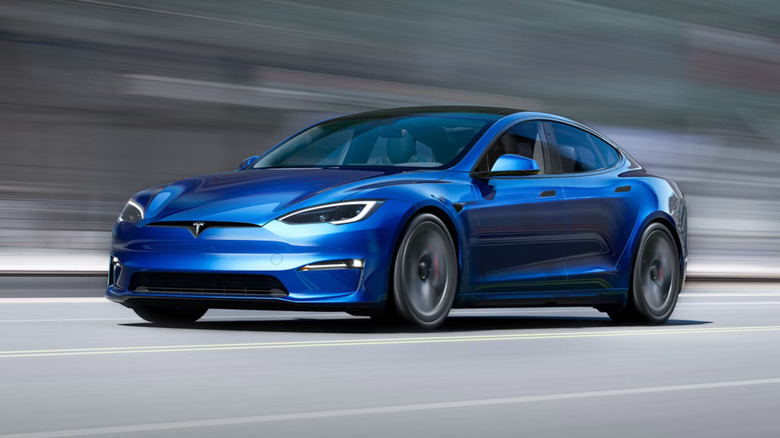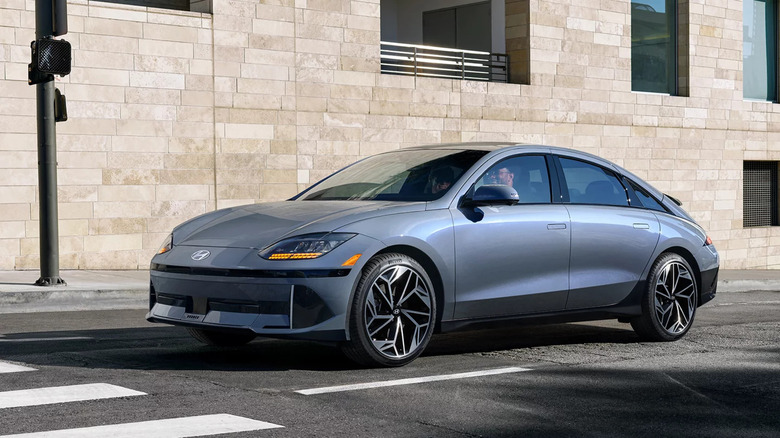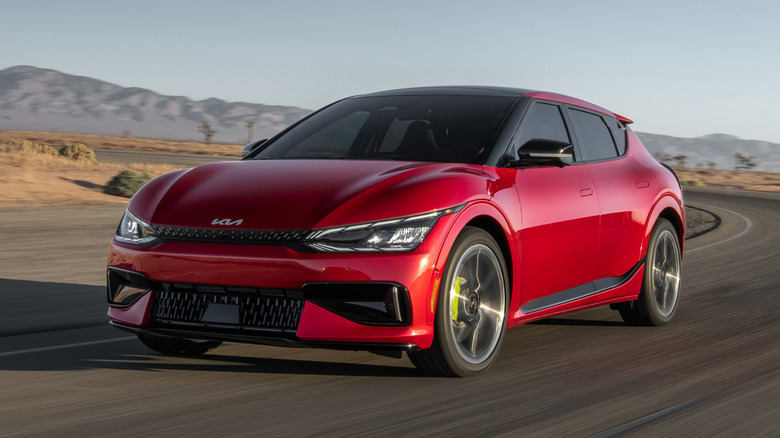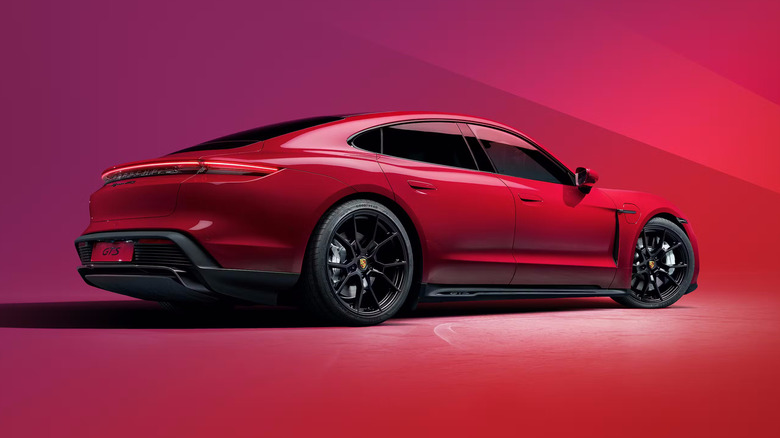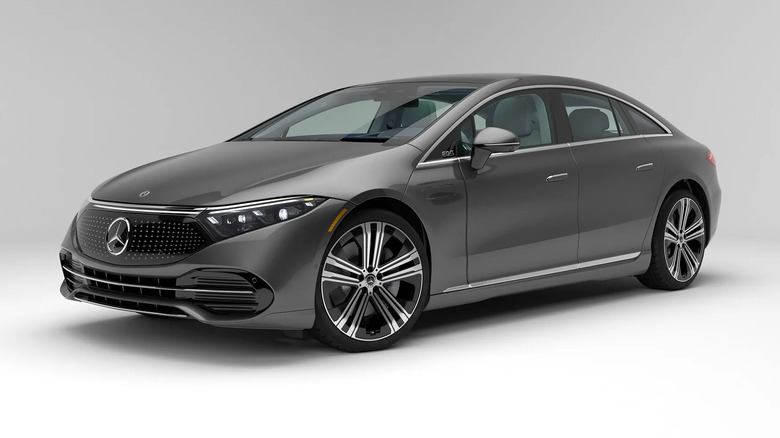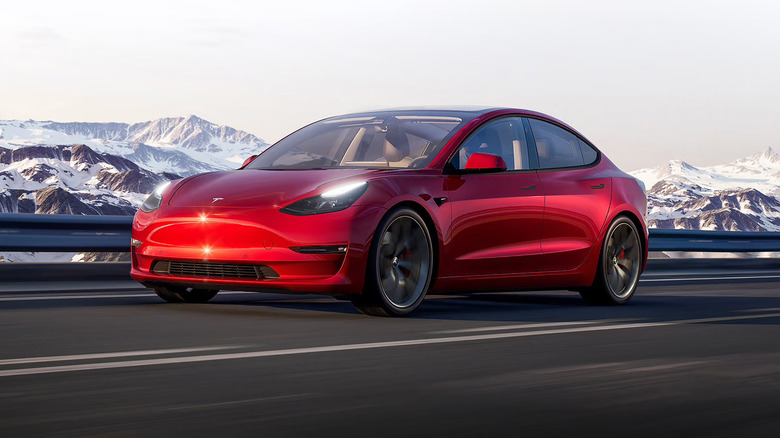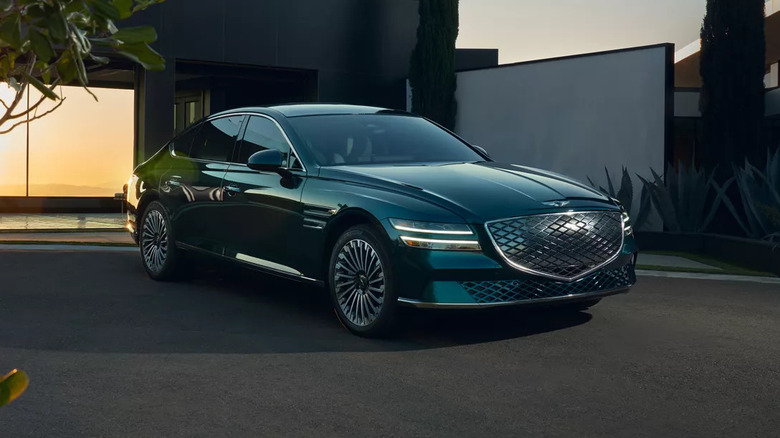Here's How Fast Every Major Electric Car Actually Charges According To Independent Testing
Electric vehicles have so many benefits, from their impact on the environment to the cost savings that occur when you don't have to purchase gasoline regularly. The one big drawback to switching over to an EV is how long it actually takes to get your car fully charged. It's not like going to a gas station for a few minutes to fill your tank. Luckily, you don't need to be around your car while it's charging, but if you need to get somewhere in a hurry with a car that hasn't been charged, you might be in a bit of a pickle.
You cannot always trust what the vehicle manufacturers say about how fast their products charge either. They will always promote their vehicles in the best light, so while their reported charging times may be close to accurate, they aren't necessarily done by those who have no stake in the performance of a particular brand. Plus, many companies will list their charging capabilities only up to 80% battery capacity rather than fully charged. Luckily, a company like Edmunds exists to test out these vehicles impartially and stack every car company against one another. In November, they released a study on testing they did of 43 different electric vehicles to see which ones charged the fastest.
Hyundai Ioniq 6
Without question, the big winner of Edmunds' rapid charging test was the 2024 Hyundai Ioniq 6 Limited. The rear-wheel drive iteration of the model with a single motor topped the charts with an awe-inspiring charging speed of 868 miles per hour, dwarfing the second-place finisher by 99 mph. According to Hyundai, the RWD Ioniq 6 has a range of 361 miles, so at that rate, the vehicle would be fully charged in about 25 minutes. Hyundai's website claims it reaches 80% capacity on a rapid charge in 18 minutes, so they may be a bit overzealous in their numbers, though not too much.
The AWD version of the Ioniq 6 doesn't fall too far behind either, as it placed third out of the 43 vehicles tested. That dual motor car still managed to charge at a speed of 764 mph. Hyundai distinguishes the RWD and AWD models in terms of range in their specs, but they do not do so when it comes to charging. Even though both are two of the three fast vehicles tested, that drop of over 100 mph is still significant.
The 2023 dual-motor Hyundai Ioniq 5 was also tested, and it still performed quite well, coming in sixth place at 673 mph. Clearly, Hyundai is putting in the work when it comes to efficient, fast charging for their electric vehicles.
Kia EV
The other big winner of this Edmunds test was Kia. Like Hyundai, two of their vehicles wound up in the top five of the list. However, unlike Hyundai, these were not brand-new 2024 models. The 2022 Kia EV6 Wind RWD came in second place with a fast charging time of 769 mph. The fifth-place finisher was the 2022 Kia EV6 GT Line at a still impressive 679 mph. Notably, we are two years removed from these cars hitting the market, and though Kia also had a 2023 and 2024 model test, they didn't place nearly as high.
The 2023 vehicle tested was the Kia EV6 GT, placing at 12 with a charging rate of 568 mph. The even newer 2024 Kia EV9 GT-Line AWD placed one spot below that at 543 mph. Kia states that its new EV9 GT-Line AWD has a range of about 270 miles, which means you're looking at about a half-hour to fully charge that vehicle. These two vehicles still place high on the list, but it is a little concerning that the speed at which these vehicles can be fully charged has slightly dipped as the years have passed.
Porsche Taycan
Now, we move into the true luxury car space. Porsche had three models of their electric Porsche Taycan tested from various years, though none of them were of the current 2024 model year. The most recent Taycan was the 2022 Porsche Taycan GTS, which placed at nine on Edmunds' list. The test showed it had a fast charging rate of 584 mph. However, this was not the highest Porsche on the list. Again, we have an older model showing strength, with the 2020 Taycan 4S showing up at fourth on the list. This one bests the 2022 GTS by over 100 mph with a charging rate of 690 mph.
Bringing up the rear for Porsche was the 2021 Taycan 4S Cross Turismo with 21-inch wheels. That car still managed a solid 569 mph charging, solidly placing it at 11 on the list. For the 2024 Taycan, Porsche claims that it can reach 80% capacity in 22.5 minutes with fast charging. With a range of just 208 miles, that doesn't do many favors for guessing where it would have ended up on Edmunds' list had it been tested.
Mercedes-Benz EQ
Seven different models from Mercedes-Benz's EQ line were used for this test, and only one of them wound up in the top 10. That would be the 2022 Mercedes-Benz EQS 450+. With a fast charging rate of 593 mph, this EV was able to place at seven on Edmunds' list. While a very good placement, this number does represent a significant step down from the aforementioned sixth-place finisher, the Hyundai Ioniq 5, which has a 673 mph rate. This spot is the break from the tier-1 chargers to tier-2.
The remaining six models of Mercedes-Benz all placed between 15 and 25 on the list, with the 2022 EQS 580 4matic charting highest with 530 mph and the 2023 AMG EQE the lowest with 413 mph. Once again, no 2024 models were tested, but the highest a 2023 model was able to place was the 2023 EQE SUV 350+ at 518 mph. If the 2024 iteration of that SUV is comparable with a 279-mile range, you are looking at a 31-32-minute charging session to get to full power.
Tesla
All of the other car companies mentioned thus far split manufacturing between electric vehicles and gas-powered ones, but Tesla is the first one here to exclusively make EVs. You would think that vehicles would perform the best with Edmunds' fast charging test because of the specific focus. However, the highest Tesla that appeared on the list was at 10 for its 2023 Model 3 Long Range, tying the 2021 Porsche Taycan 4S Cross Turismo with a 569 mph charging rate.
Two different Model Y vehicles were tested. Ironically, the 2020 Model Y Performance was the lowest-performing of the Teslas, as its charging speed of 476 mph landed the vehicle at 21 on the list. The other Model Y was a Long Range package that came from 2021 and that fared far better than its Performance counterpart, placing at 14 with 538 mph speed. The last Tesla tested fell not too far behind that model, and that is the 2021 Model S Plaid. With a charging rate of 523 mph, that was good enough to get it to 16 on the list. All four Teslas appear in the top half of the list, but maybe you'd expect a little more from the all-electric company.
The others
Edmunds tested eight other companies' vehicles for fast charging capabilities. The highest placing of the EVs not mentioned yet was the 2023 Genesis Electrified G80, which cracked the top 10 for an eighth-place finish with a 588 mph charge speed, outperforming every Tesla or Porsche. Lucid and BMW are the only other two manufacturers to make it into the top 20, with just one model apiece. The 2022 Lucid Air Grand Touring came in at 18 with a charge rate of 518 mph, while the 2024 BMW i5 eDrive40 closed out the top 20 at 477 mph.
The last two spots on the list of 43 vehicles tested belonged to Chevrolet. The 2022 Bolt EUV Premier brings up the rear of the list with a charging speed of just 172 mph. The standard issue 2022 Bolt doesn't fare much better at 179 mph. These two vehicles firmly set themselves at the bottom of the list, as the third-lowest rated vehicle is the 2022 Ford Mustang Mach-E GT Performance, which bumps the miles per hour charging speed up to 257. That Ford is one of six models tested, and the highest any of them get is 33, with the 2021 Ford Mustang Mach-E CA Route 1 at 332 mph. Rivian models fare even lower, topping out at 37 for the 2022 R1T Launch Edition at 316 mph.
The last two manufacturers, Volkswagen and Polestar, find themselves in the middle of the pack. Volkswagen's highest-rated vehicle was the 2021 ID.4 Pro at 27, while Polestar's was the 2022 Polestar 2 Long Range Single Motor, two spots below it. The charge speeds were 396 and 375 mph, respectively.
This list goes to show you that if charge speed is a top priority, Hyundai is the way to go.
